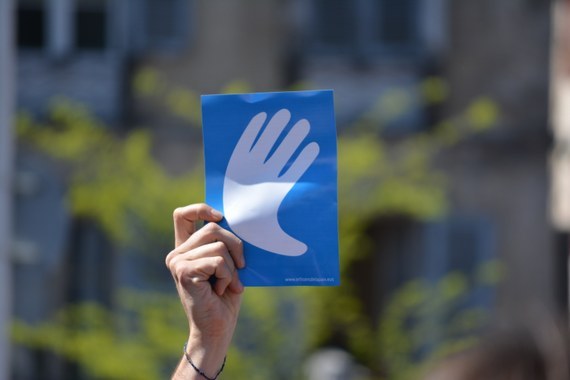ELA took part in the public event for the disarmament in Baiona and it is showing its contentment that the process was completed successfully

This mass concentration was also aimed at supporting the disarmament and the definite end to all political violence in the Basque Country. Finally, on this day the French and Spanish States were addressed to request their contribution towards the détente and dialogue in the Basque Country.
The manifesto was read in four languages, in Basque by Estitxu Eizagirre, editor of the magazine Argia, in French by Louis Joinet, ex-judge and ex-expert from the Human Rights Committee of the UN; in Spanish by Fernando Armendariz, member of the Social Forum and in English by the writer, Susan George.
Manifesto of Baiona
1. - Those of us who are here, decided that the disarmament day would be “our” day. It was a strange decision, audacious if you wish…. And we might not have dared to do this.
But, even in this case, we should say that it has not just been an idea, and much less, an improvised event.
The disarmament day is our day because we have meditated on it, we have shared it, and we have deliberated on it.
Others have also done this and have decided not to be with us today. We look at them with respect, we acknowledge them and our words are also addressed to them.
2. - We do not represent everyone as a whole, it is true. But nobody can or will be able to deny that we have come to Baiona from all over the country, from all its lands, all its peoples and from its opposing sensitivities.
And once here, we feel that, from here onwards, it will be more difficult, perhaps even impossible, to continue appealing to the people not to build peace.
3. - Those of us who are here, share something that is simple to explain: that peace is not only an absence of violence…. And likewise we share the idea that with violence there is no peace.
For this reason the disarmament was important, because it was an essential step on the road to peace.
The disarmament that took place today is a milestone that closes a chapter in our history full of pain and death and agony that we want to leave behind…. But not without looking back.
4.- Our hearts and our memories immediately turn back to the faces of the victims, to each and every one, those from the past and from the present, those who are well-known and those who are not, victims of these weapons and victims of all weapons.
On them, on all of them, a tragedy weighs and it has not been easy for us to reach this day without giving in to despair (something that not everyone could do).
Because peace is not only the lack of violence, we look at the victims and we commit ourselves to a future of remembrance and recognition, we want to obtain truth and justice and say to them, “it won’t happen again”, “it won’t happen again”.
5- We come together to look towards a future of the coexistence and mutual understanding that they were deprived from, and to straighten the routes for the new, (yes, why not?) humanising and civilising conflicts.
We also come together to ensure their memory is not perverted for our own benefit or to the prejudice of others.
6. - Our memory does not only look back to the past, but it also looks to a painful present such as that of people who are prisoners and that of their families and loved ones.
We believe that nobody loses – we all win, if the law and politics fully invest in the present, if the removal of prisoners ends and they are brought back to he Basque Country, to their own environment; if those who are ill are released along with those who have served their sentences.
We are committed to arranging their return home as soon as possible.
Because it is also necessary and it should be possible.
7. Almost six years ago, in Aiete, it was said that peace requires “courage, a wish to take risks, deep commitments, generosity”.
Because it was necessary, they made it possible: I would like to pass on to them, the craftsmen and women, in recognition of this, a warm embrace.
Because it has been craftsmanship leaving the unequal and imperfect human, profoundly human mark in this task, of the hands that work and continue to work, missing their deserved rest and the peace that is promised.
They have forged it from their own material, from this land and its people, condemned to produce the art of living together that only time will judge fairly.
8. - From Aiete something important remains: that the governments of France and Spain accept to talk and to listen in order to deal with what they have left us, and how they have left us, so many years of violence.
This must also be possible, because it is completely necessary.
There is society, there are agents, there are elected officials and legitimate institutions, and there is an international community all willing to ease the dialogue that brings us closer to a fair and long-lasting peace.
Thank you to you all.
Let us all together, be craftsmen and women of peace.
